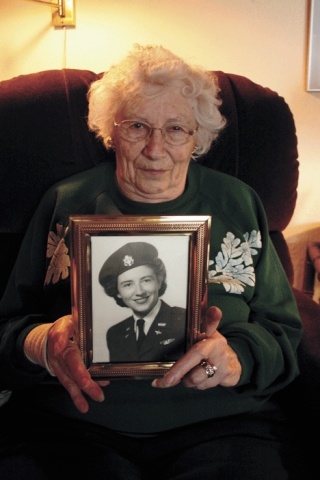Oak Harbor resident Margaret Martin may receive a Congressional Gold Medal under a bill being considered in Washington D.C.
The 87-year-old, long-time Whidbey resident took part in the Women Airforce Service Pilots, or WASP, during World War II. The military was short on male pilots to fly aircraft in the states, so women were asked to fill in.
A total of 1,102 women went through military training and got their wings, but only about 300 are still living today. Noting that the women never received any formal recognition from the federal government, U.S. Sen. Patty Murray recently co-sponsored a bill to award WASPs the highest honor a civilian may receive.
“These brave pilots have empowered and inspired decades of women service members who have followed in their footsteps,” said Senator Murray in a press release. “They took flight at a time when the idea of women aviators was thought not only improbable, but impossible. They risked their lives, but for too long their service has not been recognized.”
Martin is tickled at the prospect of receiving the recognition, but even more, she’s thrilled that all the woman who sacrificed so much to take part in the program will be remembered. Thirty-eight women died in the line of duty, but their families were saddled with the costs of burial.
“They paved the way for all those who came later,” Martin said. “They did a fantastic job.”
Martin said she got caught up in the gung-ho, patriotic fever that took hold of the country during the war and wanted to do what she could to help.
“I felt it was a privilege to do what we were doing and we were doing it because it was a great cause,” she said.
Also, Martin said she saw the program as an opportunity to fly airplanes.
“It was the love of my life,” she said. “Up there in the wild blue yonder, kind of like a bird. It was just wonderful.”
Martin, who was born on Whidbey, was working in Seattle when she heard about the program. Since applicants had to be licensed pilots, she took leave from work and went to Spokane to learn to fly. During the war years, more than 25,000 American women applied for the training. Martin was one of 1,830 who were accepted.
In January of 1944, she headed to Sweetwater, Texas, for basic training. The women went through the same demanding flight training that Army Air Force cadets received. After nine months, Martin earned her silver wings.
The women were not allowed to take part in combat, but they did a lot of important work. They flew more than 60 million miles for their country in every type of aircraft available. Their assignments included test piloting, instructor piloting, ferrying aircraft, transporting personnel, smoke laying, night tracking, flying drones and hauling cargo, including parts for the atomic bomb.
The most dangerous jobs, Martin said, were towing targets for air-to-air gunnery practice and ground-to-air anti-aircraft practice. She was happy that she was never asked to take part in those exercises.
Martin said she mainly flew a Cessna UC-78 Bobcat during the war, but also got to pilot more impressive warplanes. She said she was basically a courier, transporting paperwork and military people around the country.
Martin said that after the war was over, the military simply didn’t want the female pilots anymore. They even had to pay their own way home. They were never awarded full military status and were ineligible for officer status. It was not until 1977 that the WASP participants were granted veterans’ status.
Fortunately, Martin said she was able to continue flying for most of her life. She even piloted demonstration aircraft for a company in California.
Martin is one of 12 surviving WASPs currently living in Washington state.
Sen. Cantwell is co-sponsoring the bill along with the 16 other female senators. It is currently in committee.



